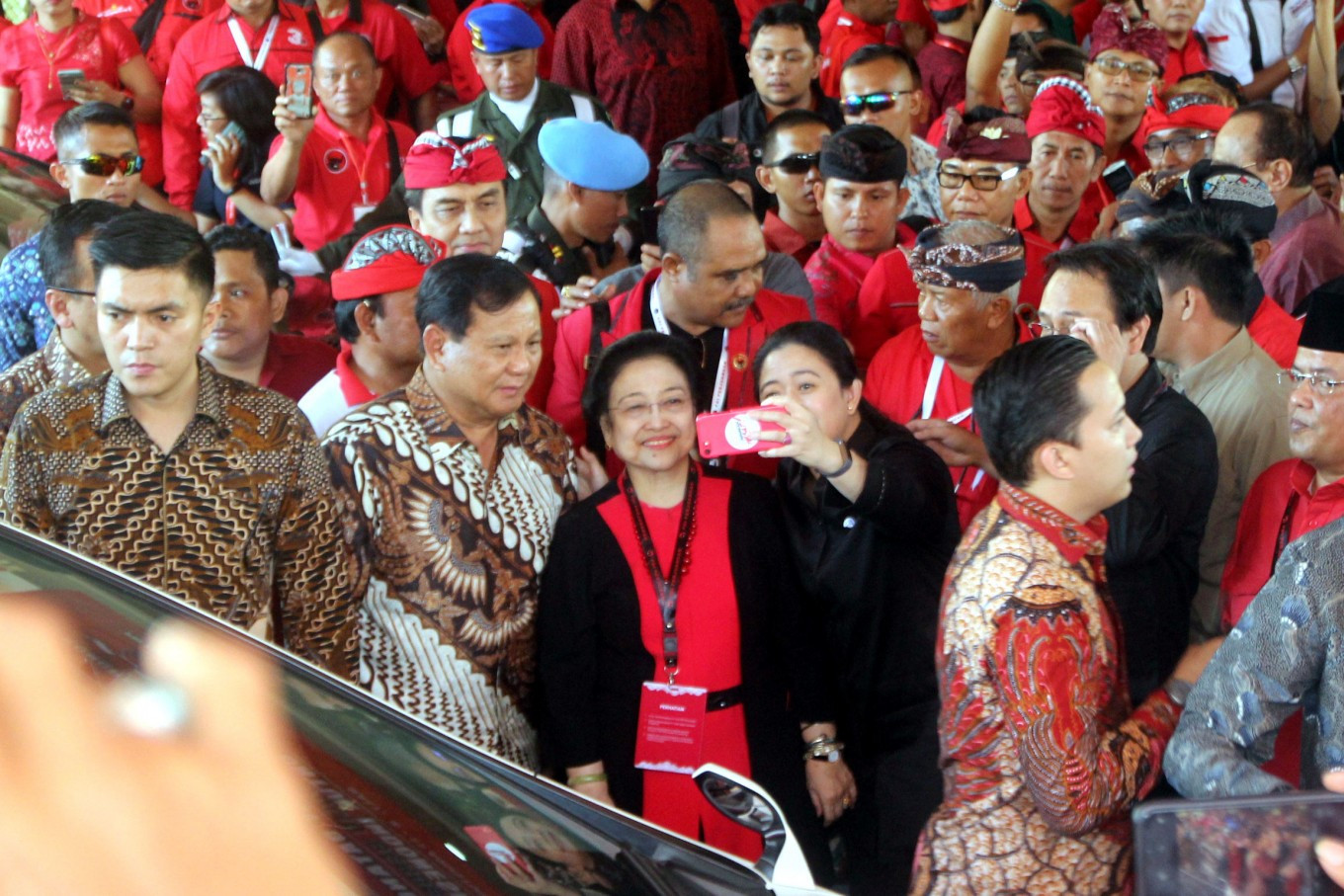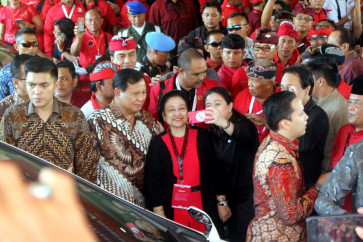Popular Reads
Top Results
Can't find what you're looking for?
View all search resultsPopular Reads
Top Results
Can't find what you're looking for?
View all search resultsAnalysis: Prabowo to meet with Megawati before inauguration
Change text size
Gift Premium Articles
to Anyone
 Gerindra Party patron Prabowo Subianto (second left) and Indonesian Democratic Party of Struggle (PDI-P) chairwoman Megawati Soekarnoputri (center) smile on Thursday while taking a selfie with Megawati's daughter and Coordinating Human Development and Culture Minister Puan Maharani (second right) on the sidelines of the opening of the PDI-P's fifth national congress in Bali. (JP/Zul Trio Anggono)
Gerindra Party patron Prabowo Subianto (second left) and Indonesian Democratic Party of Struggle (PDI-P) chairwoman Megawati Soekarnoputri (center) smile on Thursday while taking a selfie with Megawati's daughter and Coordinating Human Development and Culture Minister Puan Maharani (second right) on the sidelines of the opening of the PDI-P's fifth national congress in Bali. (JP/Zul Trio Anggono)
T
he long-awaited meeting between president-elect Prabowo Subianto and Indonesian Democratic Party of Struggle (PDI-P) matriarch Megawati Soekarnoputri is reportedly to take place before Prabowo takes office on Oct. 20. It is believed that the meeting will result in the PDI-P’s decision whether to stand with or in opposition to the incoming government. The outcome of the meeting could have a significant influence on the country’s political landscape.
The scheduled date for the much-awaited encounter, however, has remained undecided. According to the party’s deputy chair Puan Maharani, who is Megawati’s daughter, the meeting is expected to take place between Oct. 12 and 15.
Prabowo, however, appears reluctant to confirm the date. Gerindra Party secretary-general Ahmad Muzani, who is also the People’s Consultative Assembly (MPR) speaker, said any date would be okay, even after Prabowo assumes office on Oct. 20.
PDI-P executives Olly Dondokambey and Deddy Sitorus have both expressed their wish for the party to join Prabowo’s big-tent ruling coalition. Doing so would not only allocate ministerial cabinet seats to the party, but also convey harmony between the government’s legislative and executive branches, given that Puan was reelected to lead the House of Representatives for the next five years.
However, political experts believe that the PDI-P is better suited to maintaining the checks and balances of the government by serving as an opposition force, as the majority of political parties have already joined the Onward Indonesia Coalition (KIM). Even the Prosperous Justice Party (PKS), which was the only party to retain an opposition to President Joko “Jokowi” Widodo’s administration, has joined KIM to form the broader alliance, KIM Plus, for the November regional head elections.
If the PDI-P were also to join the government coalition, Prabowo’s administration would essentially run unopposed. While on one hand, politicians within the coalition have argued that such conditions would be most conducive to the efficient implementation of the government’s programs and policies, it would also exacerbate the country’s backsliding democracy, according to Trias Politika Strategis executive director Agung Baskoro.
The absence of opposition risks eliminating public consultation in policy making, as often happened during the second term of President Jokowi and during the New Order under Soeharto, Prabowo’s erstwhile father-in-law.


















